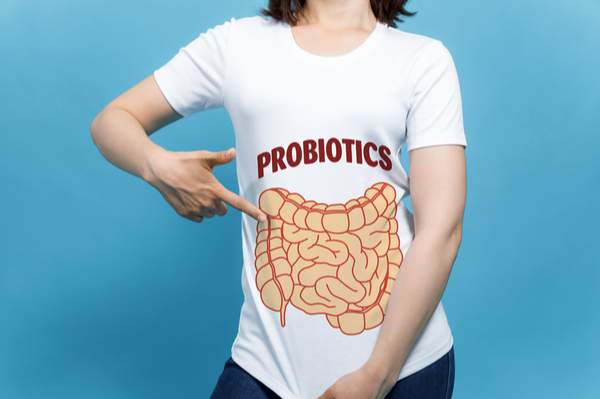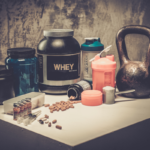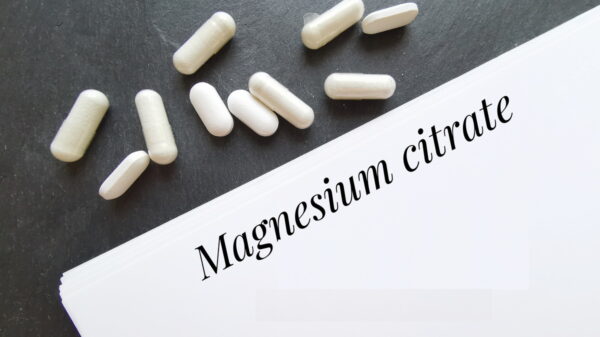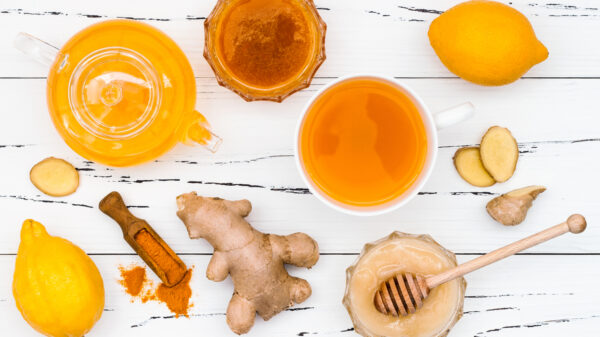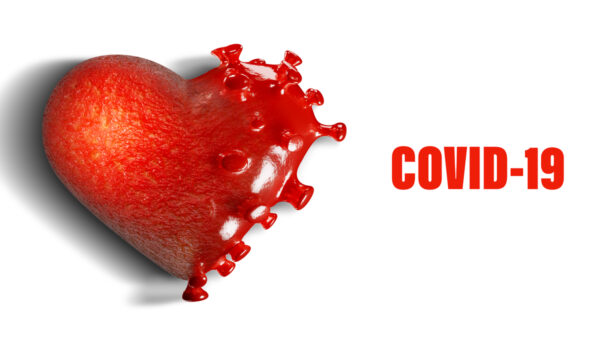In human health, the function of gut microbiota has been evaluated, which is becoming a vastly developed area of science. The main intersection between our environment and us is the gastrointestinal tract, and our large intestine contains our immune cells.
So, the function of probiotics regarding our immune system has some questions related to it. Probiotics are basically active microorganisms, very much alive if used in substantial amounts show health benefits towards the host, also works to improve gut functions, which help us conclude that it works to improve our immune health.
Gut Microbiota and Immunity
Our human gut consists of microbiota, which are 100 trillion microorganisms residing in the intestine, helping us in ways that are not possible without them, as the development of immune systems and resistance against infection. A bidirectional relationship is known to exist between the human immune system and gut microbiota.
Our gut microbiota establishes and maintains the human immune system, and consequently, the immune system maintains the relationship between our microbial community and us.
To stabilize immune tolerance and activation (inflammation) and regulate this connection, it is crucial for the proper and strong function of our immune system; communication is important between our immune cells and gut microbes.
Our intestinal health related to its barrier is the cross-talk that is affected, which is also known as “mucosal firewall”.
Intestinal Barrier Integrity
The intestinal barrier is formed and regulated due to immune system that contains a mixture of mucus, antimicrobial peptides, intestinal epithelial cells, immunoglobulin A (IgA), and other immune cells.
Besides improving the connection between microbiota and our immune system, this barrier also works to keep microbiota of gut safe by confining them to the intestine.
Mucus layer works to separate epithelium and protect it against digestive enzymes and stops bacteria from entering, thus preventing infectious and inflammatory diseases, all the while favoring the pathway of nutrients and fluids.
Epithelial cells secrete mucus, which is made up of glycoproteins known as mucins. So, a barrier is formed between lamina propria, which is a thin layer of connective tissues containing a variety of immune cells, and gut microbes due to the presence of mucus and epithelial layers.
Lamina propria abundant in a cell contains lymphocytes, both of IgA-secreting B cells and T cells, mast cells, dendritic cells, macrophages, and a variety of white blood cells, all-important in immune function.
Pathogen Response
Gut microbes are responsible for maintaining immune health by coming in contact with pathogenic microbes that work to form a hostile surrounding using different techniques, or activating our immune systems to help us.
So, our immune system, on the other hand, works to keep out gut microbiota safe from foreign pathogens by inhibiting inflammatory response to foreign substances like food that we eat.
This serves us well because involuntary action against nonpathogenic bacteria or nutritional components can lead to autoimmune and intestinal diseases, like celiac disease, inflammatory bowel disease, irritable bowel syndrome, and food allergies.
Regulatory T (Treg) cells, functions to inhibit inappropriate responses of the immune system, activated from both gastrointestinal tract and thymus gland.
Probiotics and Immunity
So, these are the actions performed by our local or endogenous gut microbes towards our immune system. But what is to be said about probiotic bacteria and microbes taken through food, supplements, and beverages?
Probiotics have demonstrated immunomodulatory properties working in direct and indirect pathways, just like endogenous gut bacteria. Using direct paths, macrophages and NK cells are worked through probiotics whiles secretion is activated of cytokines and immunoglobulins.
Using indirect paths, the gut epithelial barrier is improved; mucus secretion changed and fights pathogenic bacteria.
Benefits of Probiotics
The some of the major benefits of using probiotics are:
1. Probiotics Help Balance the friendly Bacteria in Your Digestive System:
Probiotics are known as “good bacteria”. They are live microorganism when taken; they help us improve our health benefits. The use of probiotics is due to their tendency to regain the natural balance of gut bacteria.
Imbalance means that bad bacteria are too prevalent, while good bacteria are less. These may result due to poor diet, illness, medications like antibiotics and other reasons.
As a result, they can cause allergies, digestive issues, obesity, mental health problems, and more. Probiotics are present in fermented foods or consumed as supplements. Even still, they are secure when used by people.
2. Probiotics Can Help Prevent and Treat Diarrhea:
One of the commonly known uses of Probiotic is to prevent diarrhea or minimize its intensity. Using antibiotics cause diarrhea, which is a common side effect. Antibiotics are known to imbalance and negatively impact the good and bad bacteria present in the gut.
It is seen in studies that antibiotic-associated diarrhea can be minimized by the use of probiotic. A study showed that about 42% of diarrhea due to antibiotics was cured by using probiotics. Any other form of diarrhea not due to antibiotics can also be reduced using probiotics.
3. Probiotic Supplements Improve Some Mental Health Conditions:
Many studies have observed that mood and mental health are related to our gut health. Studies conducted in animals and humans show that probiotic use has helped in mental health illnesses.
4. Certain Probiotic Strains Can Help Keep Your Heart Healthy:
Your heart health is maintained with the use of probiotics by decreasing LDL (bad) cholesterol and blood pressure. Cholesterol is reduced by break down of bile present in the gut, done by lactic acid-producing bacteria.
Bile is made up of cholesterol, helps in the act of digestion. So, probiotics help in inhibiting the reabsorption of bile as cholesterol in the blood, by breaking it down using probiotics.
5. Probiotics May Reduce the Severity of Certain Allergies and Eczema:
In children and infants, eczema can be prevented using different probiotic strains. As compared to normal infants’ milk, studies have found that infant’s milk with supplemented probiotic has seen to help in eczema symptoms.
A different study in which the kids of women who consumed probiotics during pregnancy were noted. In the first two years of their life, the kids had 83% low risk of gaining eczema.
But, the relation between low eczema and probiotics is still weak, and more research is needed. In individuals with milk or dairy allergies, probiotics have shown to decrease inflammatory actions. So, more studies are needed to find evidence.
6. Probiotics Can Help Reduce Symptoms of Certain Digestive Disorders:
In the US, more than one million people have suffered from inflammatory bowel disease, including ulcerative colitis and Crohn’s disease. Mild ulcerative colitis has been improved using different strains of probiotics obtained from Bifidobacterium and Lactobacillus.
It was found that the effects of drugs used in maintaining ulcerative colitis are the same as using supplementary probiotics E. coli Nissle. But Crohn’s disease was still of little use even with probiotics.
However, probiotics also help with bowel disorders. Different researches have shown that Irritable bowel syndrome (IBS) and its symptoms have also been improved. About 50% of severe necrotizing enterocolitis has been minimized using probiotics. This is a deadly bowel disease prevalent in premature infants.
7. Probiotics May Help Boost Your Immune System:
Your immune system is recharged by using probiotics, and it prevents the development of harmful gut bacteria. Syntheses of natural antibodies have also been done by the use of some probiotics. They also work to improve immune cells like IgA-producing cells, T lymphocytes and natural killer cells.
8. Probiotics May Help You Lose Weight and Belly Fat:
Many mechanisms are employed to help in weight loss by using probiotics. For example, probiotics work to stop the absorption of dietary fats in the intestine. It does not stay in body but rather excreted through feces.
Probiotics keep you sated with fullness, burns calories sufficiently and does not store that much fat. This may be due to an elevating number of specific hormones like GLP-1.
Microbiome importance beyond gut health
Besides gastrointestinal tract, the microbiome has other functions too. In the last decade or so, the oral cavity has been under study a lot, which has caused production of different probiotics for the mouth and other areas of the upper respiratory tract.
We know that the oral cavity consists of about 700 different species of bacteria, and it is essential to keep the mouth and its environment as healthy as possible.
Besides the development of probiotics to help in oral health, probiotics designed for oral cavity are also helpful in immune health, especially for the upper respiratory tract.
The probiotics obtained are mostly domestic to the environment of the oral cavity of humans. They mostly work to inhibit competitive behaviors, rejecting and eliminating those harmful species that enter through nose and mouth.
Some develop defensive substances, known as bacteriocin-like inhibitory substances (BLIS) that works against unfavorable strains and prevent them from entering the body.
Streptococcus salivarius is the bacteria that are found to be commonly present in the mouth of healthy individuals, and specific strains also show agreeable BLIS. The security and effectiveness of strains have been found through rigorous research.
A specific S. salivarius strain, known as K12 strain, had proved to be quite effective. This strain is human-produced which works to be more helpful in inhibiting species like S. pyrogenes and Moraxella catarrhalis.
The broadness of studies related to young children makes the probiotic a gratifying product used for improving the immune system of kids.
Surveys that are related to human microbiome increases with the increase in our knowledge by different ways which make it more beneficial for our health; it pushes the need to develop more probiotics that can assist our body’s microbiota.
Probiotics prevent Coronavirus
Coronavirus is a novel virus that cannot be seen with the naked eye. It means that healthcare professionals are still researching the behavior and mechanisms of Coronavirus that how it is transmitted and interacts with the immune system of humans.
Because of the novelty of Coronavirus, probiotics are used to prevent this disease. The current symptoms of the coronavirus are seasonal flu, and respiratory disease and treatment of Coronavirus revolve around these symptoms.
Probiotics helped to promote the immunity of the body, and it prevents you from getting Coronavirus because the stronger immune system can fight against infections and foreign invaders very well.
Probiotics prevent inflammatory responses in COVID-19 patients.
Some strains of probiotics have anti-inflammatory properties, and they function as inflammatory storms against severe and chronic medical diseases. Probiotics promote the health of the immune system, so it prevents you from different chronic and seasonal diseases like flu.
Coronavirus is an emerging disease globally, and there is no scientific evidence for the treatment of this disease still so prevention is advised, and one can keep himself prevented from Coronavirus if his immune system is strong.
Probiotic Supplements
The science behind the use of probiotics is not so complex. Your doctor will recommend you to get probiotics if you have the weaker immune system of some other mild or chronic diseases.
You should choose the probiotic supplement wisely or should use it according to the recommendation of a healthcare professional.
Sunshine Nutrition Probiotic Supplement contains microorganisms like bacteria and yeast. This supplement is made with stomach-friendly bacteria known as Lactobacillus acidophilus.
It promotes the overall health of humans, and each capsule contains 500M microorganisms that help in the absorption process and other functions of intestines.
Conclusion
The prove that exists relating to the production of further health-improving aids and the effectiveness of probiotics and maintenance of homeostasis of the body using probiotic-derived factors, also improving immune health.
But as probiotic research moves to its next step, many questions regarding the mechanism of probiotic have been asked and how to employ these probiotics for clinical uses.
For example, which factors related to the human body should be kept in mind when forming studies and analyzing their results? Plus, analyzing of therapies which require biomarkers, including the presence of probiotics in hosts is an up-and-coming topic used in clinical and translational studies.
There has a difference noted in gene expression of probiotics that are employed that varies in every person differently, as proved in human studies.
As an increase in the need for personalized medicine has been seen, the population obtained for any future clinical trial study requiring individuals of specific characteristics and microflora and also containing their unique genetic outcomes to probiotic administration.
So, the inclusion of unpredicted and interesting views of probiotic use in human illness for curing and prevention.

